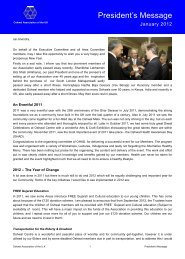June 2013 - Oshwal Centre
June 2013 - Oshwal Centre
June 2013 - Oshwal Centre
You also want an ePaper? Increase the reach of your titles
YUMPU automatically turns print PDFs into web optimized ePapers that Google loves.
Tigers<br />
By Meera Shah<br />
Author’s Note<br />
The below information is taken from a briefing pack issued to<br />
volunteers at the recent Tiger Tracks event held in London.<br />
Tigers are often described as majestic, dangerous and<br />
beautiful. Sadly though, these words do not reflect the<br />
current state of play with global wild tiger populations.<br />
Dangerous as they may be, wild tigers are actually<br />
endangered.<br />
What is the problem?<br />
In 1900, over 150,000 tigers roamed across 25 countries.<br />
Today, fewer than 3,500 remain and are found in only 13<br />
Asian countries. This represents a 97% decline and the<br />
extinction of three sub-species since the 1900s. The<br />
greatest population of tigers is in India.<br />
Why does this problem exist?<br />
1. Human encroachment<br />
The rapidly growing human population in many tiger<br />
range countries means that tigers are in direct<br />
competition for diminishing forest resources. Livestock<br />
and agriculture are shrinking tiger habitat fast, and their<br />
prey is poached by people living alongside tiger habitat.<br />
2. Poaching<br />
Tigers are illegally killed for their body parts, used for<br />
home decor, medicines and tonics. In some countries,<br />
tigers are farmed for their body parts. There are more<br />
tigers held in such farms, than exist in the wild the world<br />
over.<br />
3. Pollution<br />
In parks visited by tourists, tigers often ingest various<br />
forms of rubbish left behind by the visitors. Although this<br />
may not always be fatal, the long-term health and vitality<br />
of these remaining populations is severely threatened by<br />
this.<br />
Why should we save tigers?<br />
As top predators, tigers play a vital role in the ecosystems<br />
in which they live. The presence of a healthy population<br />
of tigers indicates healthy ecosystems. Conversely, if we<br />
lose tigers from the wild, ecosystems in those regions<br />
would suffer immensely. Where tigers are protected in<br />
parks, they provide a great source of employment and<br />
income for the tourist industry. The loss of tigers can<br />
therefore have a wide-ranging impact on livelihoods in<br />
these regions.<br />
Moreover, tigers have roamed the Earth for millions of<br />
years. It is our moral responsibility not to lose them, for<br />
ourselves as well as the generations to come.<br />
What can you do about it?<br />
1. Awareness<br />
Information is power. There are plenty of resources<br />
available on tiger conservation (see below). It is equally<br />
important to spread the message about tiger<br />
conservation. Claims of health benefits of tiger bone, etc<br />
are unfounded and have no scientific proof. Often the use<br />
of tiger body parts is connected with the killing of these<br />
animals or the devastation it causes within local<br />
ecosystems and communities.<br />
2. Shop wisely<br />
Don’t buy tiger products but buy forest friendly products.<br />
3. Donate<br />
There are various organisations that work to protect wild<br />
tiger populations. Below are some, in no particular order.<br />
WWF:<br />
wwf.panda.org/what_we_do/endangered_species/tigers/<br />
Environmental Investigation Agency: http://www.eiainternational.org/our-work/environmental-crime-andgovernance/illegal-wildlife-trade/tigers<br />
Save Wild Tigers: http://www.savewildtigers.org/<br />
Born Free: http://www.bornfree.org.uk/animals/tigers/<br />
4. Volunteer<br />
These organisations are often small and need help in<br />
their day to day running.<br />
5. Contact your local representatives<br />
Sometimes all it needs are the right people in the right<br />
place enforcing tiger protection with the right tools. Ask<br />
your local representatives to push for global treaties to<br />
protect the wild and where they are not, to introduce trade<br />
restrictions.<br />
Saving the tiger is a huge, complex but achievable<br />
undertaking, involving national and state governments,<br />
corporations, wildlife departments, international NGOs,<br />
grass roots organisations and local people.<br />
<strong>Oshwal</strong> Youth Magazine of O.A.U.K. 12 <strong>June</strong> <strong>2013</strong> Edition

















